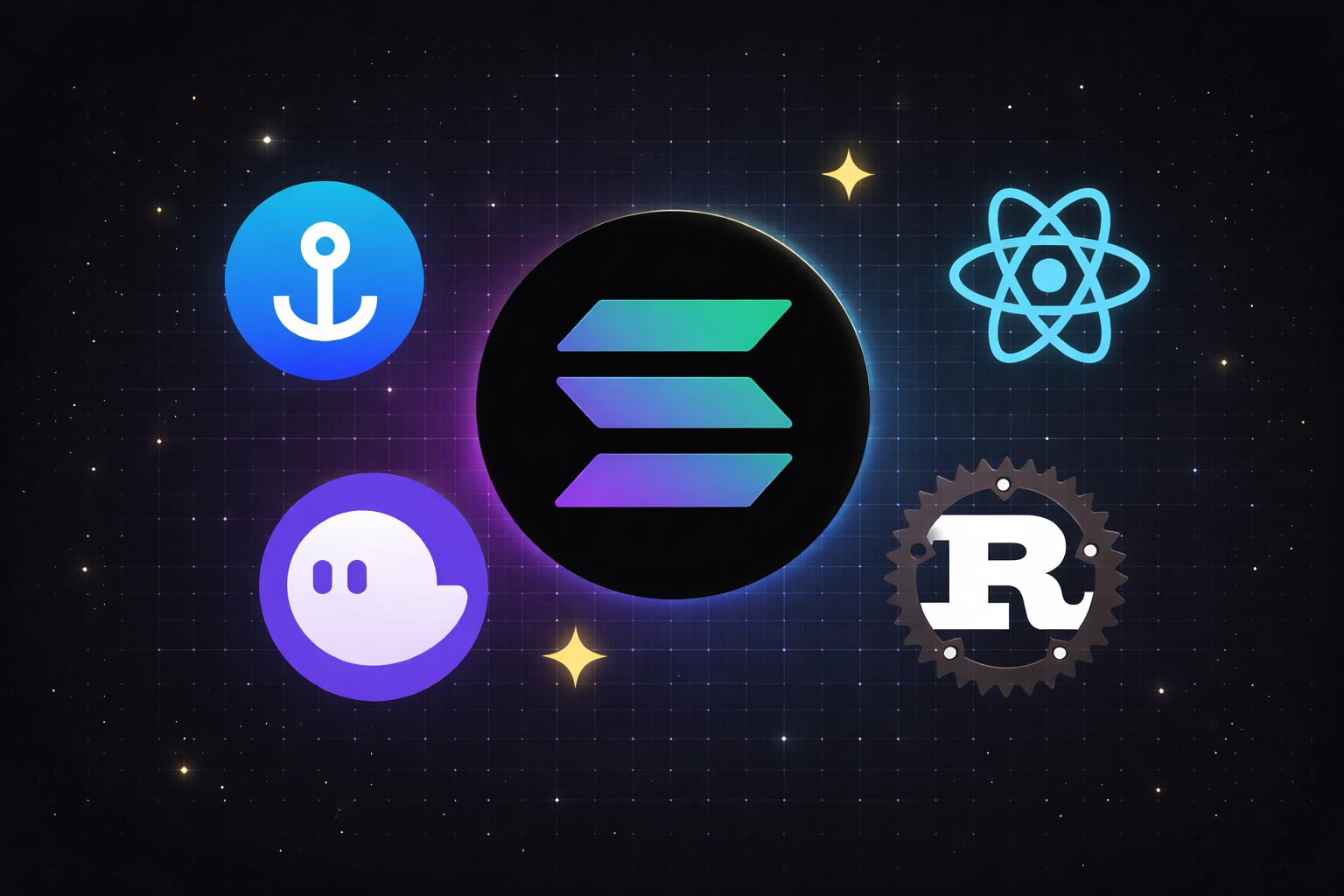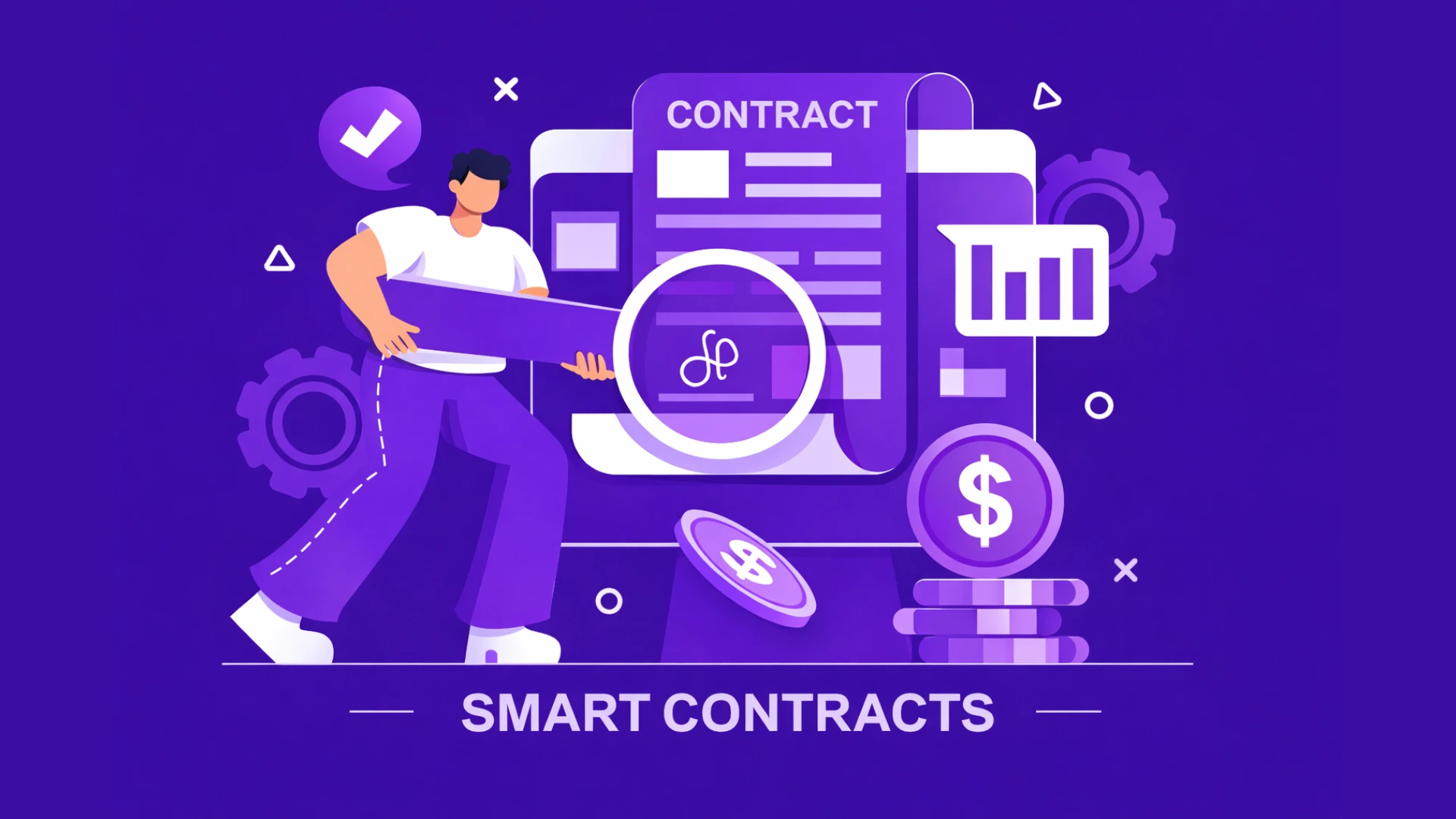Key Takeaways
- Solana smart contracts follow a stateless model, where program logic is deployed separately and all mutable data is stored inside explicitly passed accounts, enabling parallel execution.
- Proof of History (PoH) is the backbone of Solana’s performance, allowing the network to pre-order transactions and significantly reduce consensus overhead.
- Rust is the primary language for Solana program development, compiled into BPF bytecode for deterministic, high-speed on-chain execution.
- Account ownership and access control are enforced at runtime, meaning a program can only modify data in accounts it owns, improving security and predictability.
- Client applications handle all interaction logic, using Solana’s JSON-RPC and SDKs to invoke programs, manage accounts, and submit transactions.
- Deployment requires explicit network configuration, wallet setup, and SOL funding, even on Devnet, reinforcing production-like discipline during development.
-
Solana is best suited for high-throughput, low-latency applications, such as DeFi protocols, NFT platforms, and real-time Web3 systems where performance is critical.
Solana was introduced in 2017 by Anatoly Yakovenko with a single core objective: eliminate the performance bottlenecks that limit blockchain-based applications at scale. Instead of optimizing around low throughput chains, Solana was designed to support high-frequency, low-latency decentralized systems from the ground up.
With its ability to process hundreds of thousands of transactions per second, Solana has become a preferred blockchain for performance-sensitive use cases such as decentralized exchanges, real-time games, NFT marketplaces, and financial infrastructure.
To understand how to build on Solana, it’s important to first understand how Solana smart contracts fundamentally differ from EVM-based systems—and why that difference matters for developers.
What Is Solana?
Solana is a high-performance Layer-1 blockchain optimized for speed, scalability, and low transaction costs. Unlike blockchains that rely heavily on sharding or Layer-2 solutions, Solana scales directly at the base layer.
Its core innovation is Proof of History (PoH)—a cryptographic time-ordering mechanism that allows the network to agree on transaction sequence before consensus is finalized. This drastically reduces coordination overhead between validators and enables parallel execution.
Solana’s architecture makes it well-suited for:
-
High-volume financial applications
-
Real-time Web3 systems
-
NFT and gaming platforms
-
Enterprise-grade decentralized infrastructure
Understanding Solana Smart Contract Architecture
Solana smart contracts are called programs, and they follow a stateless execution model.
How Solana Differs from EVM Contracts
On Ethereum and other EVM chains:
-
Contract code and state are bundled together
-
Each contract owns its storage
-
Execution is largely sequential
On Solana:
-
Programs contain only logic
-
State lives in separate accounts
-
Programs read/write to accounts passed explicitly during execution
This separation enables parallel execution, which is one of the primary reasons Solana can achieve such high throughput.
Key Architectural Components
-
Program: Read-only smart contract logic deployed on-chain
-
Accounts: Store mutable data and SOL balances
-
Instructions: Function calls executed by programs
-
Transactions: One or more instructions bundled together
Programs cannot access arbitrary state every account must be explicitly provided, which enforces deterministic execution and improves security.
Getting Started with Solana Development
Before writing your first smart contract, you need to set up a Solana development environment.
Prerequisites
Ensure the following are installed:
-
Node.js (v14 or higher)
-
Rust (latest stable)
-
Solana CLI (v1.7+)
-
Git
For Windows users, it’s strongly recommended to use WSL (Ubuntu) to avoid toolchain conflicts.
Setting Up the Solana Development Environment
Install Rust and Solana CLI:
Add Solana to your PATH and start a local validator:
This runs a local blockchain node for testing smart contracts without relying on public networks.
Writing Your First Solana Smart Contract
Solana programs are most commonly written in Rust, compiled to BPF bytecode, and deployed as .so files.
Program Structure
A Solana program has:
-
An entrypoint
-
Instruction parsing logic
-
Account validation
-
State serialization/deserialization
Solana commonly uses Borsh for efficient binary serialization.
Example: Hello World Program (Concept Overview)
The “Hello World” program demonstrates:
-
Reading account data
-
Validating program ownership
-
Updating on-chain state
-
Logging execution output
Rather than storing state inside the program, the program updates a separate account that tracks how many times it has been called.
This pattern is fundamental to Solana development and is used in real-world DeFi and NFT protocols.
Building the Program
Clone the example repository:
Build the program:
The output will generate a compiled .so file ready for deployment.
Deploying the Smart Contract to Solana Devnet
Step 1: Switch to Devnet
Step 2: Create a Wallet
This generates a keypair used to deploy and interact with programs.
Step 3: Airdrop SOL for Deployment
Step 4: Deploy the Program
Once deployed, Solana assigns a program ID, which acts as the on-chain address for your smart contract.
You can verify deployment using the Solana Explorer.
How Clients Interact with Solana Programs
Solana programs are accessed through client applications, typically written in:
-
JavaScript / TypeScript
-
Rust
-
Python
Clients use Solana’s JSON-RPC API to:
-
Create accounts
-
Send transactions
-
Invoke program instructions
-
Read account state
This clear separation between on-chain logic and off-chain clients makes Solana ideal for scalable dApp architectures.
When to Choose Solana for Smart Contract Development
Solana is particularly well-suited for applications that require:
-
High transaction throughput
-
Low latency confirmations
-
Parallel execution
-
Predictable fees
Common use cases include:
-
Decentralized exchanges
-
NFT marketplaces
-
Gaming platforms
-
Payment systems
-
Real-time Web3 applications
Solana’s smart contract model forces developers to think differently—but that design trade-off enables performance levels that traditional blockchains struggle to reach.
By separating program logic from state, enforcing explicit account access, and enabling parallel execution, Solana provides a powerful foundation for building next-generation decentralized systems.
If your application demands speed, scale, and cost efficiency at the protocol level, Solana smart contract development is a strong architectural choice.
Solana Programming Languages

-
Rust:
Rust is the primary language for Solana smart contract development. Rust is a systems programming language that shines in performance and safety. It minimizes common programming errors such as null pointer dereferencing and buffer overflows through its strong memory safety guarantees.
Benefits of Using Rust
-
Performance
Solana blockchain architecture, known for its lightning-fast transaction times, enables Solana smart contracts to execute quickly and efficiently, making them ideal for time-sensitive applications.
-
Safety
With its robust type system and ownership model, Rust ensures memory safety without needing a garbage collector.
-
Concurrency
Rust concurrency model allows developers to write safe multithreaded code, crucial for scalable applications.
-
C and C++:
Solana also supports Smart Contract Development in C and C++. These languages ??are known for their performance and systematic resource management. They are widely used in system/software development and offer fine-grained control over memory and hardware.
Benefits of Using C and C++:
- Control– Offers low-level access to memory and hardware, providing developers with fine control over contract execution.
- Performance– C and C++ are known for their speed and efficiency, essential for the high-throughput environment of Solana.
- Legacy Code– Developers with existing codebases in C/C++ can leverage their existing knowledge and tools when transitioning to Solana.
Choosing the Right Language
When deciding between Rust, C, and C++ for Solana smart contract development, several factors come into play:
-
Experience
Developers familiar with systems programming might prefer Rust for its modern features and safety guarantees. On the other hand, those well-versed in traditional languages might stick with C or C++.
-
Project Requirements
Keep your project’s particular requirements in mind. Rust’s safety features might be necessary for new projects, while the performance and control offered by C/C++ could be beneficial for more granular operations.
-
Community and Resources
Rust has a growing community with various resources and libraries (or “crates”) available for developers. C/C++ have a long-standing history with abundant resources and support.
FAQ : Solana Smart Contract Deployment
Solana separates logic and state to enable parallel transaction execution. By keeping programs stateless and storing data in independent accounts, the network can process multiple instructions simultaneously without global locking.
It is not harder, but it requires a different mental model. Developers must explicitly manage accounts, ownership, and data flow instead of relying on implicit contract storage.
Rust provides memory safety, predictable performance, and fine-grained control, which are critical for deterministic execution and low-level optimizations on Solana’s BPF runtime.
Yes, Solana programs can be upgradeable if deployed with an upgrade authority. This allows controlled updates while preserving the program ID and existing integrations.
Clients are responsible for assembling transactions, passing correct accounts, and coordinating program interactions, making them an essential part of the system’s overall logic.
Security is enforced through account ownership checks and access rules at runtime. A program cannot modify data unless it owns the target account, preventing unauthorized state changes.
Yes, Solana’s predictable fees, high throughput, and explicit execution model make it suitable for enterprise use cases that require performance, auditability, and scalability.
Solana may not be ideal for applications that depend on heavy on-chain logic with minimal client coordination or require tight compatibility with existing EVM tooling.
Reviewed & Edited By

Aman Vaths
Founder of Nadcab Labs
Aman Vaths is the Founder & CTO of Nadcab Labs, a global digital engineering company delivering enterprise-grade solutions across AI, Web3, Blockchain, Big Data, Cloud, Cybersecurity, and Modern Application Development. With deep technical leadership and product innovation experience, Aman has positioned Nadcab Labs as one of the most advanced engineering companies driving the next era of intelligent, secure, and scalable software systems. Under his leadership, Nadcab Labs has built 2,000+ global projects across sectors including fintech, banking, healthcare, real estate, logistics, gaming, manufacturing, and next-generation DePIN networks. Aman’s strength lies in architecting high-performance systems, end-to-end platform engineering, and designing enterprise solutions that operate at global scale.







